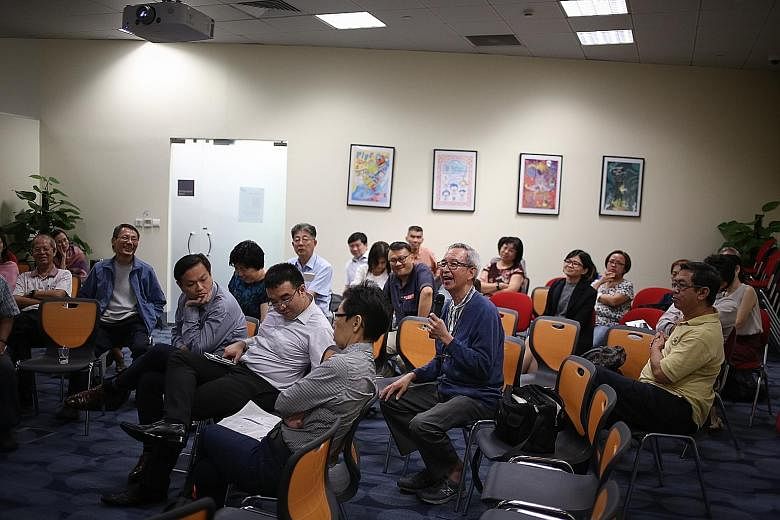When The Straits Times (ST) reader Lum Pak Meng met the legendary Iron Lady Margaret Thatcher in 1982 at Britain's House of Commons, he found her "incredibly friendly".
"That was just after the end of the Falklands War," he recalled to 50 readers at last Wednesday's Big Read Meet, "and it was because of her that Britain won the war."
The Meet is the four-year-old non-fiction book club which ST runs with the National Library Board (NLB), which this writer moderates monthly.
Mr Lum, who was then studying law at the University of London, got to meet the late British prime minister because he was also working as a research assistant to Ms Harriet Harman, Mrs Thatcher's Labour counterpart in parliament.
The 59-year-old self-employed researcher and Meet regular added that his view of Mrs Thatcher oscillated between "reluctant admiration" and "outright abhorrence" at how she whipped her country into shape such that, today, people cannot decide if she saved or destroyed it.
He recalled Mrs Thatcher because the Meet was discussing American author Jeffrey E. Garten's new book on globalisation, From Silk To Silicon, and she was among 10 leaders whom Garten credited with having "put steroids" on globalisation, which is the freer movement of people, things and ideas that enables countries to integrate.
In a lively, textured discussion, Mr Lum's fellow readers took issue with Garten's list of 10 world leaders, who besides Mrs Thatcher, included China's empire-builder Genghis Khan, its late paramount leader Deng Xiaoping and the late French diplomat Jean Monnet.
Frenchwoman Cedrine Monnet, 24, said Garten's choice of the French diplomat Monnet - no relation of hers - was apt because he worked so hard to shape the European Union (EU), as he believed that would finally end bloodshed in Europe.
She added: "As a child of globalisation, I know for sure that that was his main intention… Brexit and the election of United States President Donald Trump are too bad as those have put the world in crisis... Britain left the EU because of a fear of strangers; that is a wrong reason to leave."
Ms Monnet, who is from Lyon and works as an assistant underwriter in Tokyo, is on a two-month work attachment here until next month. Her Singapore- based colleague Yin Na, 33, from Shenyang, China, introduced her to the Meet.
Former ST journalist and Meet regular Francis Chin, 66, who works in an HR consultancy, said Britain's Queen Elizabeth I should have been on Garten's list as her "prudent financial management" brought her country much stability and enabled it to conquer many far-flung territories.
Retiree I.P. Wang, 73, who used to work at Times Publishing and also taught at Ngee Ann Polytechnic, noted that as globalisation buoyed China's rise as the world's economic powerhouse, the countries of South-east Asia had been hoping that some China factories would "go where labour was cheaper", such as within Asean, and give its people jobs.
Alas, he pointed out, China was now automating so many of its large industrial operations, including its ports, that its factories did not require many workers at all, and so, South-east Asians had lost opportunities to robots.
To that, Ms Yin said when she and Ms Monnet heard that robots would soon do the job of underwriters, they asked their bosses what they should do. "Our bosses said we don't need to worry as we would have positions there," she mused, "but now I wonder if I need to learn to repair robots."
Other readers wondered why, given a global population of seven billion and counting, world leaders today were not opposing the notion of robots replacing people or at least confine their use to dangerous and dirty jobs.
Musing on how disruptive globalisation was, former ST editor-in- chief and Meet regular Peter Lim, 79, said: "Master colonisers were the disrupters of history. Without them, would I be here, speaking English?"
Recalling a Chinese saying, designer Cheryl Yuan, 48, said the march of history, told through legends such as China's Romance Of The Three Kingdoms, showed that disruption was a fact of life: "What is long divided will be united and what is long united will be divided."


